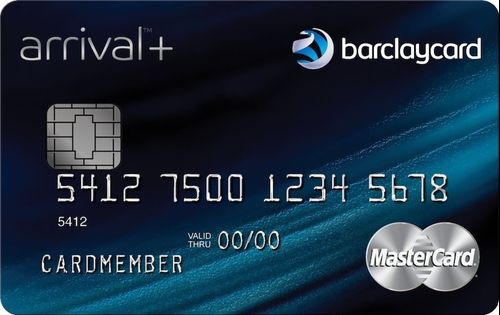Pros
- 0% intro APR on balance transfers
- High rewards rate
- 70,000 miles initial rewards bonus
- No membership fees first year
Cons
- Membership fees in the second year
- No intro APR on purchases
- Balance transfer fee
- Requires good/excellent credit
The Verdict: Barclaycard Arrival® Plus World Elite Mastercard® is the best travel rewards credit card on the market, largely because cardholders accrue maximum earnings on all purchases and have the freedom to redeem miles for any travel-related expense. It’s everything a 21st Century traveler needs in a credit card: straightforward, unmatched earnings with a no-strings-attached redemption policy that actually adds flexibility. So you should make sure to check it out if you haven’t already started packing your bags.
Barclaycard Arrival® Plus World Elite Mastercard®
Transfer Fee: 3% (min $5)
- Enjoy 70,000 bonus miles after spending $5,000 on purchases in the first 90 days
- Earn unlimited 2X miles on every purchase
- Book travel your way—no airline, seat or hotel restrictions—and redeem your miles for travel statement credits
- Get 5% miles back to use toward your next redemption, every time you redeem
- Miles don’t expire as long as your account is open, active and in good standing
Rewards Details
- Enjoy 70,000 bonus miles after spending $5,000 on purchases in the first 90 days
- Earn unlimited 2X miles on every purchase
- Book travel your way—no airline, seat or hotel restrictions—and redeem your miles for travel statement credits
- Get 5% miles back to use toward your next redemption, every time you redeem
- Miles don’t expire as long as your account is open, active and in good standing
Additional Info
- NEW - Control Your Card - Instantly secure your accounts by locking your cards with Barclays SecurHold™, plus set transaction limits and block certain purchase categories for you or your authorized users. Available only on the Barclays mobile app.
- No foreign transaction fees
- International Chip and PIN for use at self-service chip terminals around the world
- Following each balance transfer that posts to your account within 45 days of account opening*
- More Details & Reviews About Barclaycard Arrival® Plus World Elite Mastercard®
What Sparkles?
Barclaycard Arrival® Plus World Elite Mastercard® offers more value per dollar than any other travel rewards card on the market (excluding co-branded offers, which lack flexibility yet may provide greater earning potential for certain brand-loyal consumers). Highly profitable, relatively unrestrictive travel rewards are thus the Arrival Plus Card’s bread and butter. And while it does ostensibly have some financing value, there are a few potentially costly qualifications to consider in this regard (explained in the next section).
- Competitive Initial Bonus: Things start with a boon, as cardholders who spend at least $5,000 during the first 90 days their accounts are open rake in 70,000 bonus miles redeemable for a $700 statement credit to cover the cost of any travel-related expense (offer available for a limited time). This includes airfare, hotel reservations, rental cars and all the other biggies.Ultimately, this feature does not alone distinguish Arrival Plus in the competitive market for applicants who have excellent credit. A number of other cards offer at least as much value. It’s certainly not a deal-breaker, though, serving as an important piece of the card’s overall rewards package.
- Unparalleled Ongoing Travel Rewards: The value isn’t all front-loaded, either, as users earn the miles-equivalent of 2%+ cash back across all purchases – accruing two miles per dollar spent and receiving a 5% rewards discount when miles are redeemed toward travel costs.That’s an unbeatable combination for people who travel at least twice per year, prefer to book airfare and hotel accommodations on comparison sites, and/or don’t want to sacrifice ongoing value in order to take advantage of the historically valuable initial bonuses currently offered by many credit cards for people with excellent credit.
- Generously Defined "Travel-Related Expenses": Miles can be used to pay for purchases made through the following types of companies once they post to a user’s card account. For people who travel regularly and thus have ample redemption opportunities, this is effectively the same thing as cash back.
- Discount Travel Sites
- Airlines
- Hotels/Motels
- Car Rental Agencies
- Cruise Lines
- Trains
- Buses
- Taxis
- Limousines
- Timeshares
- Travel Agencies
- Ferries
- Campgrounds
- $89 annual fee waived for the first year: Barclaycard Arrival Plus is a great option for travelers who are in the market for a quick rewards score. And while the annual fee is more than five times higher than that assessed by the average credit card, it is waived the first year and it doesn’t stop Arrival Plus from being one of the most rewarding cards available. For example, the average person would earn more than $1,500 in net rewards value over the first two years of use, even with the annual fee factored in.
- No Foreign Transaction Fee: The Arrival Plus Card doesn’t assess a foreign transaction fee, which means international charges won’t be inflated by 2% to 4%, as would be the case with the vast majority of other credit cards. The fact that it’s a Mastercard also means that cardholders will be able to get the lowest exchange rates on currency conversion.
The Dim Truth
No credit card is perfect, so despite having obvious appeal, it’s fair to expect Arrival Plus to have its share of flaws. Here are the biggest issues:
- Relatively High Fixed Costs: The Arrival Plus Card’s annual fee is $89 starting the second year. To help you put this fee into perspective, one only needs to spend $4,450 per year in order to earn $89 in travel rewards and thus break even based on standard miles alone (i.e. not factoring in the initial bonus).The average person — who charges roughly $32,010 to his or her credit card each year and would obviously qualify for the $700 initial bonus — comes out roughly $1,550 ahead after two years. In other words, the more you spend each year, the more worthwhile this card will be – provided you pay your bill in full every month and make approved travel-related expenses frequently enough to benefit from regular statement credits.
- Despite 0% Intro Rate, Balance Transfers Don’t Measure Up: With so many consumers laden in debt and many unwilling to sacrifice luxuries like travel and travel rewards, this particular account feature could prove quite costly to those who don’t read the terms and conditions closely enough. In return for 0% financing on transferred balances for 12 billing cycles, cardholders must pay a fee equal to 3% of the amount being transferred. That would equate to $210 for the average indebted credit card user, based on their roughly $7,000 balance, and significantly alter the card’s value proposition.
- Potential For High Regular APR Fuels Finance Charges: Your ongoing interest rate could be 18.24% to 25.24% (V), with the lowest level being reserved for people with the best credit. Considering that the average credit card for people with excellent credit has a 14.56% regular rate, this particular account term can’t be considered among Arrival’s advantages.
- Redemption Restrictions Add Hassle: Cardholders must have at least 5,000 miles to redeem for cash back and 10,000 miles to redeem for a travel statement credit. That means you’ll need to strategically decide when and how to redeem in order to avoid leaving miles unused or keeping your account open longer than you want to.
Fool’s Gold
Before you completely make up your mind about the Barclaycard Arrival® Plus World Elite Mastercard®, there are a few other, less obvious factors that warrant consideration:
- Cash Back Redemption: It’s best to avoid redeeming Arrival Plus miles for cash back or gift cards, as miles are much less valuable when used in this manner – $0.005 per mile, compared to more than one cent per mile when redeeming for a travel statement credit.



WalletHub experts are widely quoted. Contact our media team to schedule an interview.